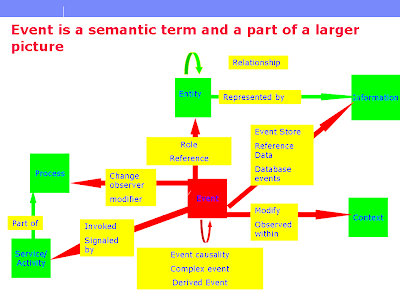2008-08-15T11:21:00.009+03:00
 These are the citizens of hawktown, chosen to start this Blog posting. The issue of first class citizens has been discussed recently by Paul Vincent in a recent Blog posting that also cites Forrester's Blog on the four classical elements : Process, Services, Events and information.
This is interesting, since it presents events as first class citizens in the computing world. Paul asks whether CEP is a fifth element and proposes the following diagram.
These are the citizens of hawktown, chosen to start this Blog posting. The issue of first class citizens has been discussed recently by Paul Vincent in a recent Blog posting that also cites Forrester's Blog on the four classical elements : Process, Services, Events and information.
This is interesting, since it presents events as first class citizens in the computing world. Paul asks whether CEP is a fifth element and proposes the following diagram.

In the introduction class that I am giving to my students in the event processing course I am showing a slide that explains how events relate to the rest of the universe, interestingly in this slide as first class citizens there are all the four elements identified by Forrester -- process, service, event and information, with addition of two elements - entity and context; entity is often considered to be hidden behind information which represents it, and context has not yet gained recognition as a first class citizen, although
some analysts think it will become a first class citizen.</span>
 This illustration does not provide all connections among all elements, but it is an event-centric view of the universe, let's go briefly over the different connections of events to the rest of the universe:
1. Event can be related to another event - by various types of causality, by the fact that an event is included in a complex event, and by the fact that an event is a participant of the derivation function of a derived event (further discussion is here).
2. Event can be related to context - by the fact that it starts or ends context-instance, classified to context, and is created within a certain context.
3. Event can be related to service - by the fact that service can be either a producer or a consumer of an event, a service may emit events, and an event may be sent to a service, or even invoke a service.
4. Event can be related to process - by the fact that process state may be observed as event, while an event can affect (insert/modify/cancel) a process, or affect the orchestration of processes.
5. Event can relate to entity - by the fact that event references entities within a certain role; more semantic view of event processing can be done also according to relationships among entities.
6. Event has various relations to information -- it can be represented as a (kind of) information, a database operation by itself can be an event (like in active databases) and the result of derived events can be a database update action.
For Paul's question - how does CEP fit in? I agree that CEP touches all, but would not use Venn Diagrams to show the connections here.
This illustration does not provide all connections among all elements, but it is an event-centric view of the universe, let's go briefly over the different connections of events to the rest of the universe:
1. Event can be related to another event - by various types of causality, by the fact that an event is included in a complex event, and by the fact that an event is a participant of the derivation function of a derived event (further discussion is here).
2. Event can be related to context - by the fact that it starts or ends context-instance, classified to context, and is created within a certain context.
3. Event can be related to service - by the fact that service can be either a producer or a consumer of an event, a service may emit events, and an event may be sent to a service, or even invoke a service.
4. Event can be related to process - by the fact that process state may be observed as event, while an event can affect (insert/modify/cancel) a process, or affect the orchestration of processes.
5. Event can relate to entity - by the fact that event references entities within a certain role; more semantic view of event processing can be done also according to relationships among entities.
6. Event has various relations to information -- it can be represented as a (kind of) information, a database operation by itself can be an event (like in active databases) and the result of derived events can be a database update action.
For Paul's question - how does CEP fit in? I agree that CEP touches all, but would not use Venn Diagrams to show the connections here.
- I view event, process, information, entity, service and context as conceptually different terms, thus there is no intersection between any two; There are relations between each pair.
- The main function of event processing is to process event, meaning take one or more events as input, do something (transform, enrich, aggregate, find pattern, derive...) and produce one or more events as output. Interestingly event processing has relations with all the six entities (I'll use EP instead of CEP, since I am using the CEP according to its glossary definition and not according to the "marketing" definition - see discussion here)